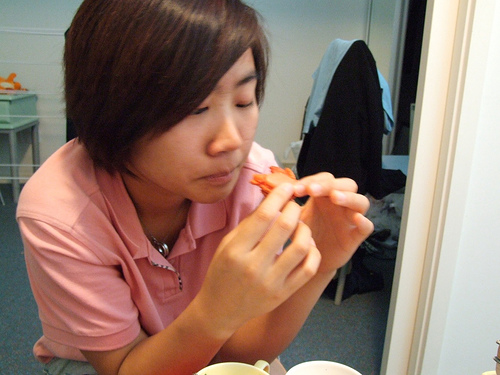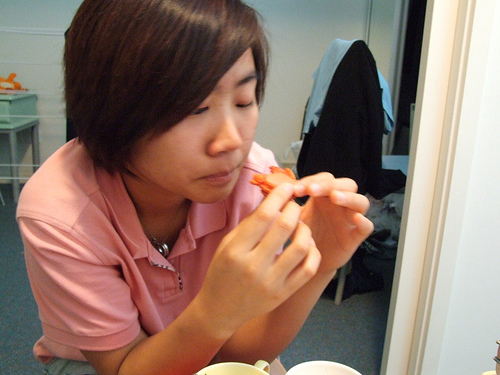 The other day I saw a tease on the front page of the New York Times that pointed to an article about the Buddhist practice of mindful eating, paying attention to each bite you take, meditating on its texture, relishing it, and considering how it got to your table. “Isn’t that Ignatian?” I said to a Jesuit friend. “I remember it being an important part of my 30-day retreat.” Yes, he said, but people think it’s cool if it’s Buddhist.
The other day I saw a tease on the front page of the New York Times that pointed to an article about the Buddhist practice of mindful eating, paying attention to each bite you take, meditating on its texture, relishing it, and considering how it got to your table. “Isn’t that Ignatian?” I said to a Jesuit friend. “I remember it being an important part of my 30-day retreat.” Yes, he said, but people think it’s cool if it’s Buddhist.
Now Buddhism is thousands of years old and I have no doubt that mindful eating is an important part of Buddhist teaching and practice. But many probably don’t realise that thanks to St Ignatius’ “Rules for Eating” Catholics also have this as part of their rich tradition. In the Gospels food is a very important symbol. After all, Jewish tradition held in high importance who you shared meals with, not to mention having specific directives and guidelines for what you could eat (“You may eat any kind of fish that has fins and scales, but anything living in the water that does not have fins and scales must not be eaten.” – Leviticus 11:9-10). And when one of the most important Christian sacraments is instituted at the dinner table, eating food and table manners must be carried out with a certain reverence.
For those on his 30-day silent retreat, Ignatius proposes some rules for eating. The purpose is to be more reflective and mindful in every part of life, even eating. Let me lay out his basic rules in plain language:
- Imagine eating in the presence of Jesus. Model the way he eats and drinks. He also focused on his friendships, not the food.
- Basic staples of one’s diet are less prone to overindulgence (like bread or water).
- As for drinking, I should maintain proper moderation and drink only what is helpful to me, avoiding what might be “disordered excess”.
- If I’m more attentive to what appeals to my appetite I am better able to control what and how much I eat. (Practise abstinence by eating sparingly of rich and delicate foods).
- Find a mean in my eating habits—I don’t want to get sick, but I can find the right balance and it may even enhance my spiritual life.
- Consider the atmosphere while eating. Music? Reading? Silence? It is helpful to move my focus beyond just hunger.
- Slow down. Be mindful of the amount of food I eat and the way I eat it.
- Plan ahead. When I am not feeling hungry I can predetermine what I will eat at my next meal and not give into the temptation to break my resolve.
After a couple weeks into my own 30-day retreat I remember my spiritual director asking me to read these rules. He even told me to consider how each food on my plate made it there. It transformed the rest of my retreat. From the buffet I took only what I was going to eat. I relished each bite, its flavours, its textures. I considered the farmers who grew the asparagus I was eating. Was it picked by hand or machine? Some cow in a distant state gave its life so I could enjoy this meatball. I considered the workers who processed and ground the meat and the trains or trucks that delivered it to the local store. And the tomatoes in the sauce may have come from a different farm than the asparagus, shipped to a factory that processed it into sauce and canned it. All this slowed down my eating and allowed me to enjoy less food than I might normally shove down my gullet. Many nights I’d skip dessert. I found myself more appreciative of what was placed before me and it soon affected my appreciation of God’s gifts and how even with food I can become indulgent and heedless.
The practice of mindful eating is not about fasting. While that may be part of one’s personal diet, eating with greater awareness and care allows us to
- take personal responsibility for our nourishment and promote personal discipline,
- keep in mind those in the world who may just barely have staples to survive,
- and put greater focus on God who gives us the gift of food (gratitude).
Nutritive moderation encourages physical health and spiritual health. Joseph Tetlow, SJ says that “Obesity, unless it is an intractable medical disorder, is strong evidence of a spiritual disorder, an unruly appetite eroding spiritual and even moral freedom.” (Making Choices in Christ) Buddhism has got something right when it comes to making eating part of one’s spiritual practice, but it doesn’t own the license on mindful eating. Ignatian spirituality, just like Catholicism, has a deep tradition of taking the ordinary—like a piece of bread or a meatball or the act of eating—and discovering how it points us to God.
“So, whether you eat or drink, or whatever you do, do everything for the glory of God.” (1 Corinthians 10:31)









Very nice — except for quote by Tetlow. Some obesity is rooted in things like abuse, and doesn’t reflect one’s spiritual journey at all!